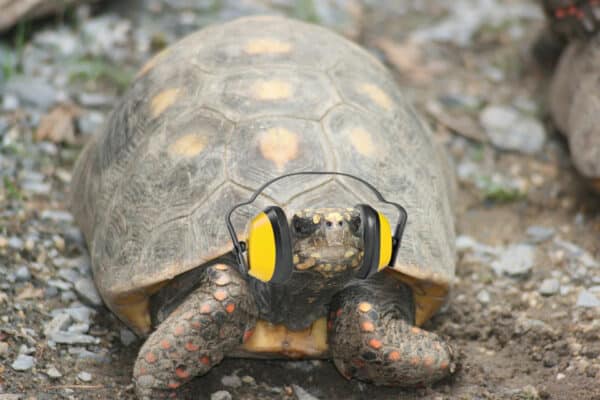
Ultrasonic cat repellers are used by people who want to keep cats away from their homes for various reasons. Luckily for tortoise owners, such high-frequency emitting devices do not affect tortoises because they do not hear the ultrasonic frequency.
When you live in a house, you are very likely to deal with different pests, whether it’s insects or mice. They are very unpleasant, but there are always solutions to get rid of them. However, when the problem is a local cat that keeps venturing onto your property and leaving surprises in your garden, you may look into an ultrasound device as a means of deterring them.
Ultrasound devices can be great at keeping certain unwanted furry visitors from your garden or yard. But what do you do if you have a tortoise that lives out in your garden? Will the tortoise be affected by the ultrasound?
If you want to use an ultrasound device to keep cats away but worry about the well-being of your tortoise, you might be rethinking your decision. To help you, we have prepared this article with more details on the matter.
Why Are Cat Repellers Used?
Cats are amazing animals loved by many people, but when they jump into people’s gardens and use different spots as their toilets, it can become a nuisance to clean up after them. Not to mention the fact that you may have items such as plants or a trellis in your garden that you do not want to be damaged. You might even leave some food for the tortoise outside in the open that you do not want disturbed by a cat.
Cat repellers are used to keep felines away in these situations. They are silent to the mature human ear, and being unpleasant to a cat’s ears simply makes sure they do not use the garden as their litter box again. It’s a humane solution because the cats are not harmed in the process – they are simply kept away by the sounds they hear.
Can Tortoises Hear Ultrasonic Cat Repellers?
Before purchasing an ultrasonic cat repeller, you may be worried about your tortoise. Whilst you’ll certainly want to keep the cats away, you won’t want to do so at the expense of your tortoise’s well-being.
Well, as mentioned, fortunately these repellers do not affect tortoises in any way. The reason is that tortoises just cannot hear ultrasonic frequencies. Ultrasound is very high-pitched (more than 20,000 Hz), and tortoises cannot hear any type of frequency that is higher than 1000 Hz. So, there is no reason to worry if you intended to purchase an ultrasonic cat repeller because your tortoise will be completely oblivious to the sounds emitted by the device.
What Is the Hearing Capability of a Tortoise?
While tortoises can hear, they do not hear as well as many other animals. Their ears are not visible, and people often mistakenly think that tortoises cannot hear because of this. However this could not be further from the truth – tortoises can still hear, and even though their ears are not visible, they certainly still have them. Of course, they are very hard to spot, and they do not look or function exactly like the ears of a human, cat, or dog. Indeed sometimes they cannot be seen with the naked eye due to the smooth and flat surface of the tortoise’s head.
Tortoises are able to process a minimum range of sound frequencies. Sounds they can process and respond to include those made by adult tortoises that are dueling, eggs that are hatching, and of course, mating.
The ears of the tortoise work differently compared to other species. In simple terms, they are great at hearing low-frequency sounds, as their ears are very sensitive to them. Tortoises can even navigate using low-frequency sounds as an aid. Again, high-frequency sounds like those made by ultrasonic devices are well out of their range, meaning they cannot hear them.
How Does a Tortoise’s Ear Work?
A tortoise’s ear has different parts. Just like in mammels, the inner ear and middle ear are two of them. Unlike mammels however, the external ear does not exist, so as a replacement, there is a flap of skin, or ‘tympanic membrane’ on the outer side, which help capture sound waves so the tortoise can hear.
However, because the external ear is non existent, this is part of the reason why tortoises hear fewer sounds compared to other species. There is a wide range of noises they cannot hear.
Once sound is picked up via the tympanic membrane the middle ear helps with processing the sound. After the sounds reach the inner ear, they are sent to the brain so it can analyze them. Tortoises can thus hear and react to these sounds.
Tortoises may even be able to hear music at lower frequencies, so if you’re listening to music with lots of bass in it, the chances are the tortoise will be able to hear the low frequencies. Whether you’ll be able get them to dance to it is another matter entirely!
How Much Can a Tortoise Hear?
Tortoises have a very low hearing range in comparison to other animals. Usually, tortoises can hear sounds between 200 and 800 Hz. Therefore, they will not respond to sounds that exceed 1000 Hz.
Meanwhile, humans can hear sound frequencies that are between 20 Hz and 20,000 Hz, which is clearly a much wider range than a tortoise.
The Bottom Line
If you are having trouble with a neighbor’s cat coming over to your garden and making a mess, you can use ultrasonic cat repellers safe in the knowledge that your tortoise will be unaffected.
Because a tortoise can only hear low-frequency sounds, high-frequency sounds such as those caused by ultrasonic devices will never be heard by your pet reptile. Therefore, they will not be affected, and they can live their daily life without this being a possible cause of stress.

